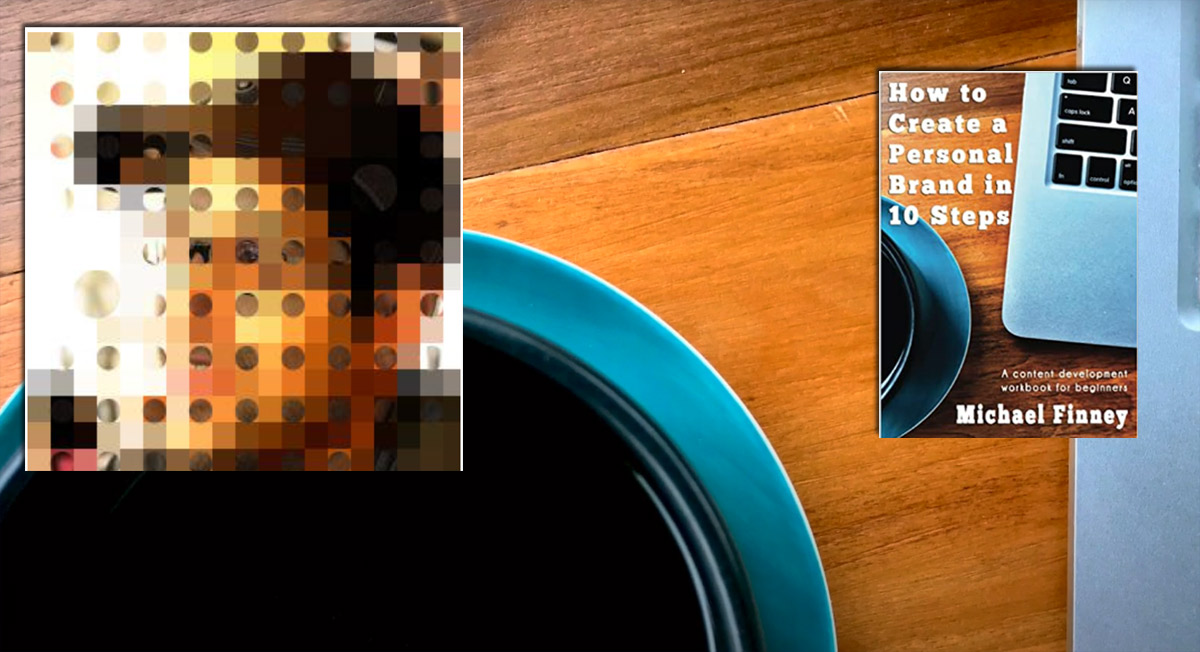Thought Leadership Studio Podcast Episodes:
Interview with Personal Branding Expert Michael Finney
Episode 22 - Interview with Michael Finney - Author of How to Create a Personal Brand in 10 Steps

#branding, #consulting, #contentmarketing, #influencermarketing, #insight, #interviews, #leadership, #personalbranding, #visibleleadership
Or Click here to listen or subscribe on appWhat this episode will do for you
- Learn about personal branding from expert Michael Finney.
- Gain insight into the relationship between meaningful achievement and designing the impression you make.
- Discover ways to assess and improve your personal brand.
- Explore the relationship between personal branding and thought leadership.
Personal Branding and Thought Leadership.
To me, personal branding is to some degree emergent from practicing effective thought leadership. If you are leading an audience to a fresh perspective that empowers them and that they appreciate, they will associate those positive feelings with you or your thought leading organization.
Leading an audience to positive feelings has a strong impact on personal brand. And the media used for Strategic Thought Leadership is common with that used for Personal Branding.
I also recognize that there is value in addressing personal branding specifically. And there are specialists in the field who can give someone a jump start in building a strong personal brand, especially when they are just starting out.
I recently became acquainted with personal branding expert Michael Finney and feel his insights can be quite helpful to thought leaders and aspiring thought leaders in general.
Michael Finney, author of How to Create a Personal Brand in 10 Steps
Michael Finney has over 15 years experience creating content marketing campaigns in fields like telecom, security, medical services, entertainment, and more. He is the author of How to Create a Personal Brand in 10 Steps which is available in book form on Amazon and as a course on Udemy and Gumroad.
Curated Transcript of Interview with Michael Finney on Personal Branding
The transcript is lightly edited for clarity and is a partial transcript- the full interview is on audio. Click here to listen.
Chris McNeil: I'm with Michael Finney, who has created a program called How to Create a Personal Brand In Ten Steps. For those of us involved in anything with thought leadership, of course, personal branding is a part of that.
And Michael's also a full spectrum content producer from the Midwest. He's worked with music, audio, video, photography, and writing over a 20 year career, and has worked with a wide range of clients in various things that are related to personal branding.
Glad to have you here, Michael.
Michael Finney: Hey, thank you for having me on, Chris. I'm looking forward to discussing everything today.
What does working on your personal brand do for you?
 Chris McNeil: So, to start, what is the difference in someone who has really attended to creating a strong personal brand versus one who hasn't?
Chris McNeil: So, to start, what is the difference in someone who has really attended to creating a strong personal brand versus one who hasn't?
Michael Finney: Well, I think that somebody who hasn't is somebody who has not necessarily spent a lot of time like focusing into specialties or creating a professional identity that is linked to a skill set or a knowledge base that they can translate into improvements for other people.
So that is maybe the negative factors.
The positive factors would be like as soon as you understand those things, right, and you've started to connect and start to get some momentum with some aspect of your career or your professional skills or whatever ... marketing those things and making it known through content or your profiles on social networks or the things that you give out when you meet people, whether it is your work business card or a separate professional business card that you create for yourself.
These are all things that tie into that and set people apart.
Chris McNeil: So setting people apart is what having a strong personal brand does for someone. And if someone's working with you, where do you usually start?
What kind of questions do you ask to find out where they're at and start to define where you'd like to help them get to?
Michael Finney: Well, it really starts with the question that you started with, right? In the sense you know, their strengths or their weaknesses, or what's working for them?
And that's where I start asking questions like, Okay, well tell me about your career, or tell me about your trajectory, or tell me about your goals. And assess what they have established. Are they blogging? Do they have a personal website? Do they have personal social networks that have a professional vibe to them as opposed to a family vibe or any number of other types of presences that we can make on social networks.
I like to mix it up a lot personally. Every network is a different way of expressing yourself and some component of yourself through different ways, whether it's words or images or video or sound, or our capacity to curate other people's work. You know, that really is the way through which we refine our message and distribute it.
Chris McNeil: What kind of trends have you noticed in personal branding in general over the years?
Michael Finney: Well, lot of people kind of think it's, it's coming to an end, because like the saturation of influencers has maybe peaked. Maybe it's hit a peak, but maybe it hasn't. Maybe it's just stratifying in different ways, you know?
I don't think that people are ever going to be any less attached to their name though. And because of that, the idea of personal branding is maybe just a ladder rung within the larger ascent that we make professionally in our careers.
And like, it might just be that like you establish this personal brand at some phase as a way of making the next step to starting an agency or making a leap into the next phase of your career, whether that's like a second act or maybe, you know, moving into a higher role with more responsibility and pay, things like that.
The relationship between designing the impression you make and focusing on meaningful achievement.
Chris McNeil: Yes, it makes sense it would apply to just about any professional context. It has to do with the impression that you make on people.
And is it about designing that impression? Or is it about focusing on what you do for people and amplifying how much people revere the special benefits that you might uniquely bring to an audience?
Or is it kind of a combination of those? Or how do you see that?
Michael Finney: Yeah, I think it's a combination of those two things. But I also think that like we as individuals - as we are putting these aspects of ourselves out there - need to think in a more reductionist capacity, right? We put so much in so much variety - and I'm guilty of this too, you know - and to kind of distill ourselves down into a couple of things that really we can keep pulling on these threads over time, you know?
So I have a couple of projects that, that are my projects that I've been doing, one of which is called Chicago 1893. And this is a thread I've been pulling. It started as a social media thing. It turned into a book. That turned into an audio book. And then that turned into a documentary and a line of merch. And it's now is getting into augmented reality.
And, you know, it has its own momentum and it has its own will in a sense, to a degree that exists beyond me.
And that's - as any business is - that's kind of what we want them to do. But I think you can't see that on day one, right? And you really have to just put that first block down. And then, eventually you get to stand back and, and look at the construction of what you've made.
But it, it is something that you have to be patient with and roll with some punches here and there.
Chris McNeil: Well, that's fascinating to me to look at the difference between say, a strong corporate brand that is relatively independent of an individual leader or thought leader or founder versus like Tesla that pivots really strongly on the personal brand of Elon Musk in so many ways ....
Michael Finney: Well, okay, so let's, let's talk about that. I'm not sure that Tesla does pivot on the brand of Elon Musk so much as that Elon Musk has created a personal brand that is a constellation of the projects that he's involved with.
Chris McNeil: Fair enough. Okay.
Michael Finney: So like, when we think of, when we think about Elon, right? We immediately are thinking about like solar energy and rockets and batteries and electric cars and tunnels and flame throwers and PayPal ... And that constellation of brands is underpinning all of the notoriety or headlines that he is generating as an individual.
And those things reflect back on the brand to a degree, I suppose. But I don't really think that they're bigger, they're having a bigger impact than that constellation of brands does to our perception of him.
Chris McNeil: So the personal brand is - in part if not all, and in the eyes of at least some - a reflection of accomplishments like that. That creates it. Is that how you see it?
Michael Finney: I think that's a fair statement. Because people do really want to know: What have you done and generated? What can they look at? What is your track record? What is your portfolio?
And, for me, I have the clients that I work with professionally, but then I have the things that I do personally and realistically, you know, I want the personal work to be the things that are most attached to my name, because they're things that I care about, and they are the most expressive projects that I am professionally exposing, in regards to my personality and who I am as an individual.
Chris McNeil: So exposing and putting a lens and directing people's attention to accomplishments, and I am speculating, but the kind of work you do, it seems that some of it might be helping people revere things they've already done at a higher level and amplify them to the public. Some might be maybe more audience-centered in actually going out and doing things that would have an emergent effect on a personal brand.
Michael Finney: Definitely. And the thing that you were talking about there, that first point about being able to crystallize our message about ourselves. We are all relatively bad about speaking about ourselves, and that's something that I work on as well.
Like, I'm constantly trying to refine how I basically translate what I do for other people...even before we went live here recording, like giving you my bio. It's like, I have this short bio that's kind of like this thing, but then really I have this other slightly longer bio that's probably more appropriate for you. And like in a resume sense- we gear and tweak our resumes to fit a particular job and then create a cover letter - that really even gets more granular and doing that kind of thing and self reflective sort of linguistic analysis of who we are and what we do and how we fit into the larger ecosystem is perhaps not something that people do enough of so that they can continue to improve with their metamorphosis over time.
Getting starting with media for personal branding
 Chris McNeil: And what role does media play, just like in terms of visual branding... Is it like branding a business? Imagine you're a tube of toothpaste at the grocery store on the counter next to 20 other tubes of toothpaste. What's going to make it visually pop so somebody notices you?
Chris McNeil: And what role does media play, just like in terms of visual branding... Is it like branding a business? Imagine you're a tube of toothpaste at the grocery store on the counter next to 20 other tubes of toothpaste. What's going to make it visually pop so somebody notices you?
Is that a piece of it?
Michael Finney: Sure. Yeah. Sure. Yeah. So like, now you're kind of getting really into the specifics of that like 10 step program. So there's a whole lot of, here's how you write, here's how you develop imagery. Here's how you speak. Here's how you exist in front of a camera. Here's how you network, here's how you distribute. Right?
And, and I'm being very broad in those terms, because there are very specific instructions, and like, the cool thing about that program is that like in every single chapter, you're instructed to create, and you end up with something that you can use on your personal brand. And by the end of it, like you should have all of the assets necessary and have created a few things to actually put yourself out there.
I think that really is the important thing. Like, if you want to be a writer or if you wanna write a book -if that's your goal - well then you have to write, you have to write chapters, which means you have to write pages, which means you have to write paragraphs, you have to write sentences, you have to get ideas out of your head.
So doing that regularly, just scheduling time to do that is required. If it's not natural for you, if you want to make podcast appearances or you want to develop a podcast, well, then you have to get in front of the microphone and speak. And develop a kind of candor and a tone about yourself so that you are engaging, you're conversational, you're present.
If you want to do video, and again, I'm not an in front of the camera person, but if you want to do video, then turn the camera on and you can read scripts or you can just kind of wing it and see how well you you do and watch back and review yourself and take notes and say, "you know, I was weak here". I was strong here. This worked. That didn't work. So it's a lot of those things. And it walks you through how all that fits together in terms of content marketing, right? Like, if you, if you aren't sure about what your strengths are or your skills are that you want to market and sell and attach your name to, that is okay, right?
Work through this process. And by the end of it, you might know, Okay, well that's not my thing. This is now my thing. Dial into that. And that might change a little bit over the course of your career or over the course of a few years, if you're trying to start a business or you're trying to get something off the ground - some venture, some project, or just your own personal brand, and you want to exist within some niche, just get started. Just start and start putting out content of some kind. And it really is an opportunity to think and improve your understanding as you do research and put words together and collect your thoughts.
The purist, the marketer, and the hybrid.
Chris McNeil: You're making me think of a couple different types that I've run across. And one might be the purest artist or musician, and I'm thinking specifically of a musician that I've played with - a musician who was very dedicated to its instrument, very dedicated to improving his skills and to helping the band make a better song with his contribution, but was averse to anything having to do with sales or branding or marketing.
It's like, Oh, we want to dress this certain way to attract people at his venue, wanna do even doing photography shoots. He was such a purist. And, and to me that's a limiting mindset, but I've seen it in a number of people who are more on the artist/creator side, where they're very into honing their art, but have some blocks to promoting their art. Does that make sense? And have you run across that?
Michael Finney: Oh yeah, 100%. Yeah. Yeah. And I think that that's a very common on that side of things, but that can't be how you exist professionally. That's not the point of entering the market.
Chris McNeil: Yeah. What's the point of making fantastic music if nobody listens to it, because you haven't attracted people to give it a try?
Michael Finney: Right? Same scenario. But maybe that wasn't his particular goal, you know, his goal wasn't to be popular. His goal was just to make music, and that was like enough for him?
Chris McNeil: Well, his (goal) actually was to be popular. (laugh)
Michael Finney: Oh, well then, you know, you gotta do the stuff.
Chris McNeil: Well, that's the thing ... that's the limiting belief I see here and there. And it's not really fair because I think it comes from the negative connotations that marketing has to some people, because they see marketing purely as "make someone feel bad and sell them something to make them feel good", which might be like remedial marketing.
But there's also the generative marketing of helping people feel great, and get more value, and make smarter buying decisions. It's about educating and empowering them and help them lead a richer life just through the communication.
And this is just a shift in belief that seems to need to happen for some people. So it just makes me wonder, you know, have you run across that?
How do you deal with it ... with people who have that?
Or are you not seeing it as much ... because since you sell personal branding, people are already kind of embracing the concept of honing their personal brand by the time they work with you?
Michael Finney: I see both, right? I see people that I work with, we have sessions and then like, they're running. They're off. You know what I mean? Like, it clicks for them and they just find their thing for themselves.
And then I find other people that it's like, okay, we are doing sessions. And you begin to perceive them really kind of like shrinking back from it. Like, okay, it's not for them, That's not their thing. And maybe they go off and do something else, and like this idea that they had kind of falls by the wayside.
So yeah. I see both. And like, and it might just be that like they weren't as into that idea as they were the beginning. Maybe it wasn't the right idea. Maybe they learned that over time. But, at the end of the day, they still take away the underlying concepts that we worked on. Like nothing, you know, that, that I'm talking about doesn't translate to their next thing that they, they work on, you know?
I think that somebody that has some kind undercurrent of entrepreneurial spirit, or kind of like boot strappiness, you know, it's gonna reach out at some point inside of them. They're not gonna be able to like tamp it down forever.
Quick self-assessment of personal brand.
 Chris McNeil: Yeah. If you're in business, you gotta sell - that simple - whether you realize that yet or not on some level. You have to do that.
Chris McNeil: Yeah. If you're in business, you gotta sell - that simple - whether you realize that yet or not on some level. You have to do that.
If you just had a very short conversation - five minutes in the elevator with someone that said, "What's a few questions to ask myself to quickly assess where I'm at with personal branding?"
What kind of questions would you recommend?
Michael Finney: I would say, do you have a short bio? Do you have a portfolio? Do you have a website? Do you have a social presence? Do you have some of the other, next level assets? ...Like press kits or one sheets? Do you have merchandise? Do you have events or engagements? ... stuff like that, that's interesting.
That's kind of the way I think of it because like, you know, people then can begin to think about. "What's the next stage after this?" Then, speaking is a great vehicle. That's live, that can be online. There's, there's a lot of different ways.
Chris McNeil: So like tiers or levels of types of media that people would graduate to as they evolve in their personal branding? Like this is a tier one? If you just have a social presence, or tier two, you've got a website or tier three, you've got things like a press kit and you speak in events?
Michael Finney: Well, sure. And then like, you know, at some point you get to a level where it's like maybe you have, uh, a video program or a television show or something like that, you know, or who knows.
The transcript is lightly edited for clarity and is a partial transcript- the full interview is on audio. Click here to listen.
***************************************
Free Stuff and Offers Mentioned in Podcast
***************************************